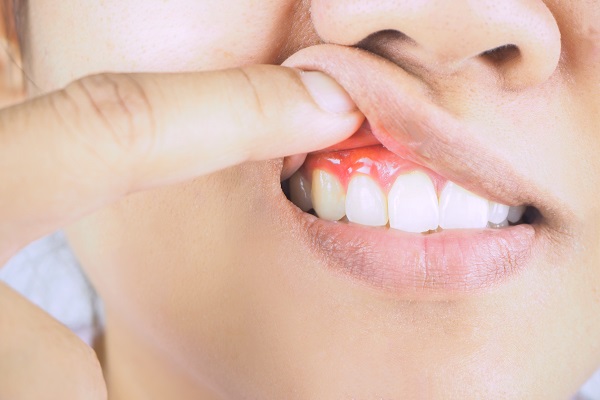Is Gum Disease Preventable?

Gum disease is one of the most common oral health issues. Many individuals, however, are unaware that they are dealing with the condition. Gum disease is believed to affect millions of adults in the United States, according to the International Journal of Health Sciences. Many people who do not currently have gum disease may develop it eventually, which is why it is crucial to know how to prevent this condition that has claimed many adults' teeth and has been linked to many health conditions.
An overview of gum disease
Periodontal disease refers to a group of disorders that affect the gums and consequently, the teeth and bones. It leads to gum inflammation, which may have major health ramifications. The first indicators of gum disease are bleeding gums while brushing, inflammation, and tenderness.
Other signs of gum disease are foul breath, sensitivity, and a terrible taste in the mouth. Once the condition has progressed to its later stages, the teeth become loose or unsteady due to receding gum tissues, and patients may experience significant discomfort. If left untreated, gum abscesses will develop, and eventually, tooth loss will occur. If gum infections grow severe enough, even general health may become affected. Various factors can cause gum disease, including:
Poor oral hygiene: Gingivitis, the early stage of gum disease, develops when plaque lingers too long on the teeth due to not brushing, flossing, or seeing a dentist regularly.
Hormone changes: During adolescence, pregnancy, and menopause, changes in metabolism and hormone levels may disrupt the mouth's organic balance, resulting in this condition.
Certain ailments: Periodontal disease may be exacerbated by severe medical disorders that limit the body's capacity to create sugar. Diabetes, strokes, and heart attacks are just a few of the conditions that have been linked to this problem. Gum overgrowth may occur as a side effect of several drugs used to treat illnesses, making the gums more vulnerable to infection and disease.
Dry mouth: Xerostomia, or dry mouth, is a common side effect of several drugs that may reduce saliva flow. The elderly are more susceptible to dry mouth due to the decline in salivary flow that occurs with age.
Gum disease is also caused by teeth clenching and grinding, which weakens the tissues around the teeth.
The oral health consequences of gum disease
Gum disease has multiple stages. Gingivitis, the most prevalent form of early-stage gum disease, is treatable but does not usually show symptoms. Patients should get treatment from the dentist as soon as they notice that their gums are red, swollen, or sore. Gingivitis may develop even with good oral hygiene because germs and plaque prefer to stay in hard-to-reach places in the mouth.
Periodontitis, a more severe and dangerous type of gum disease, may develop if gingivitis is not treated. Periodontitis, which is linked to tooth loss and gum degradation, is a potentially dangerous condition for the teeth and gums.
Preventing the occurrence of gum disease
The good news is that gum disease is completely preventable. It requires maintaining proper oral hygiene practice, which includes frequent dental checkups.
The damaging build-up of plaque and bacteria on the teeth and in the mouth is one of the primary causes of gum disease. During a regular dental visit, the dentist can perform a professional cleaning to reach regions that patients often miss while brushing. This cleaning is usually sufficient to deal with gum inflammation and restore oral health.
Even if the gum disease has worsened to the advanced stages, patients can still get different treatment options. It is essential to speak with the dentist to know the next steps. To maintain maximum oral health and avoid periodontal disease, patients need to take note of the following:
Brush twice a day and floss once a day: Brushing and flossing remove plaque and food debris from the teeth and gum surfaces and between the teeth. It is important to replace toothbrushes every few months or when the bristles start to fray or wear out. Using antibacterial mouth rinses also helps keep the mouth clean.
Consume a well-balanced and healthy diet: Choose healthy foods from the five major dietary groups: grains, dairy, fruits, vegetables, and meat/poultry. These are vital for gum health and reduce gum disease risk.
Dental visits are important
As with any condition, prevention is better than the cure. Dental checkups enable the dentist to keep track of your oral health and catch any condition before it worsens. Signs of gum disease include red and inflamed gums, bleeding gums, recession, halitosis, and loose teeth.
If you have identified any indications of gum disease, contact your dentist immediately because early diagnosis and treatment are critical. The dentist will examine the condition of the gums and recommend the appropriate treatment.
Request an appointment here: https://www.carmelsmilesdentist.com or call Smiles in the Village Dentistry at (317) 200-3679 for an appointment in our Carmel office.
Check out what others are saying about our dental services on Yelp: Gum Disease in Carmel, IN.
Related Posts
Dentists recommend proper oral hygiene from a young age to achieve good dental health for a lifetime. This is important for cosmetic reasons, but also to maintain overall health. One of the consequences of not brushing and flossing correctly is gum disease, which is also known as periodontal disease. This condition originally affects the gums,…
The CDC reports that almost half of adults in the United States have a form of gum disease, also known as periodontitis or periodontal disease. For adults over 65, this number increases to 70%. This rampant disease is largely preventable, yet the subtle signs and symptoms in the early stages leave many patients unaware that…
Finding out you have gum disease may prove worrisome. Correcting the issue may seem daunting, especially since you do not understand how it developed in the first place. The good news is, in many cases, with the right mindset and a few adjustments to personal hygiene routines, the issue can be controlled. Find out some…
Gum disease affects about half of adults living in the United States who are over the age of 30. However, you might not even know you have gum disease until it has progressed to the point that it is difficult to reverse. Let's take a look at the top five signs of gum disease everyone…


